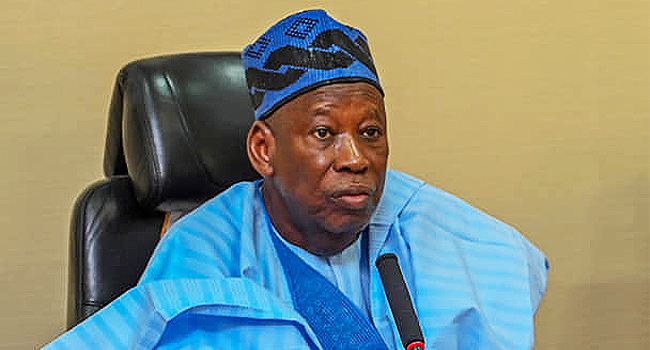A Federal High Court in Kano has restrained the executive members of the All Progressives Congress (APC) in Ganduje Ward, Dawakin Tofa Local Government Area of the state, from further action on the purported suspension of the APC national chairman, Dr Abdullahi Umar Ganduje.
The order came barely 24 hours after a Kano State High Court presided over by Justice Usman Na’abba granted an ex-parte order affirming the suspension and ordering the former Kano State governor from overseeing the affairs of the party.
Reacting to this development, lawyers who spoke with Daily Trust expressed disappointment in a situation where courts of coordinate jurisdiction have been giving conflicting orders.
Granting the latest ex-parte order on Thursday, Justice Abdullahi Muhammad Liman directed all respondents to refrain from implementing or giving effect to the suspension of Ganduje pending the hearing and determination of the fundamental right of a fair hearing filed by the APC national chairman before the court.
- Ondo gov’ship: 171, 922 delegates to elect APC candidate Saturday
- Minister, CDS vow to curb oil theft in N/Delta
The court also directed parties to maintain the status quo before the emergency meeting of the APC executive members of Ganduje Ward and to stay all action in respect of this matter pending the hearing and determination of the application.
Justice Liman fixed April 30 for hearing in the matter.
Daily Trust reports that following the Wednesday order affirming the suspension, the APC National Legal Adviser, Prof. Abdulkareem Abubakar Kana, described all that has happened as fraud and insisted the order was not enforceable. The party’s ward executives had also petitioned the National Judicial Council (NJC), demanding sanctions against Justice Na‘abba for granting the ex-parte order affirming Ganduje’s suspension.
Speaking with Daily Trust, a renowned constitutional lawyer, Professor Auwalu Yadudu, said the development was quite unfortunate, adding that politicians were the ones dragging the courts into ridicule.
He said because a court is not allowed to drive away those approaching it for justice and because courts don’t act on the basis of what is in the media or public domain, cases of conflicting orders “are not entirely unexpected.
He added that, except when vacated, both orders remain effective, as parties will then choose to work with the one that favours them.
On his part, an Abuja-based lawyer, Hameed Ajibola, said if it is found that the subject matters are the same in each of the suits, it should be recommended “that the lawyers who represented the applicant in the later application be referred to the Disciplinary Committee established by the Legal Practitioners’ Act to discipline erring lawyers and to serve as a deterrent.”
He added that the second “order or application is or would be an abuse of court process if the subject matters are the same.”
Also speaking, a human rights activist, Barrister Inibehe Effiong, said the development was embarrassing, adding that with the recent efforts of the leadership of the judiciary, “one would have thought that the instances of conflicting orders by courts of coordinate jurisdiction would be a thing of the past.”
“Our courts should be very wary of politicians. This is quite unfortunate, and I hope this kind of situation will be addressed and something will be done about it,” he added.
The lawyers also made reference to a related development in the ongoing pursuit of former Kogi State governor, Yahaya Bello, by the Economic and Financial Crimes Commission (EFCC). Two courts had also granted conflicting orders as regards the anti-graft agency’s move to effect the arrest of the former governor.

 Join Daily Trust WhatsApp Community For Quick Access To News and Happenings Around You.
Join Daily Trust WhatsApp Community For Quick Access To News and Happenings Around You.


